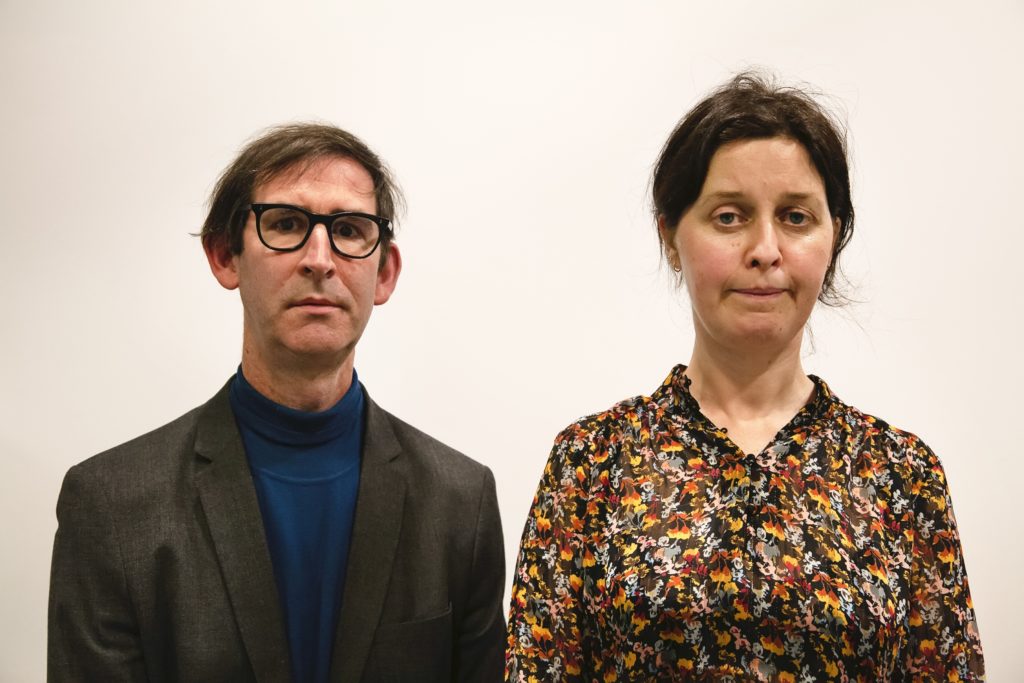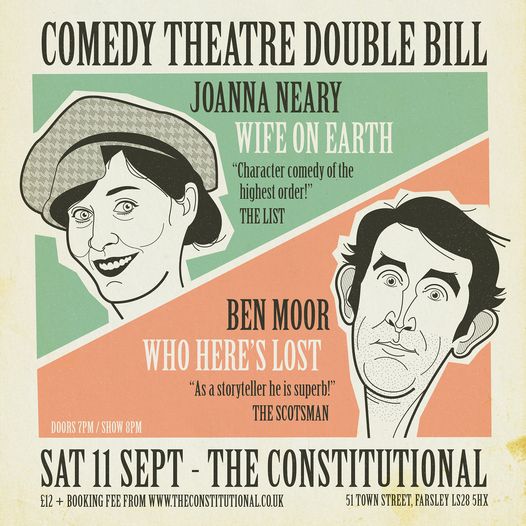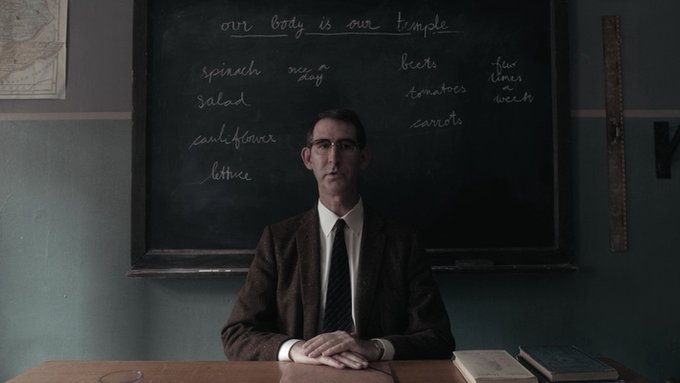
MOOR, Moor, Moor is in store when Ben Moor takes over Theatre@41, Monkgate, York, for a mini-season of offbeat comedy with Joanna Neary from October 21 to 23.
Ben presents Pronoun Trouble, A Comedy Lecture, on Thursday at 8pm; then he and fellow writer-performer Joanna team up for an unconventional comedy double bill on Friday at 7.30pm.
Neary’s Wife On Earth, a multi-character sketch show with songs and impersonations, will be followed by Moor’s Who Here’s Lost?, his dream-like tale of a road trip of the soul taken by two outsiders, a melancholy, uninspired artist and a mute architect, as they seek an understanding of what they have made with their lives while visiting some quirky landmarks.
Saturday opens at 3pm with Joanna’s debut children’s puppet show, Stinky McFish And The World’s Worst Wish, and concludes at 7pm with the two-hander BookTalkBookTalkBook, a “silly author event parody show” wherein Moor and Neary portray a pair of writers trapped inside a book festival. As the event spins beyond their control, it degenerates into an absurdist comedy about authorship, artificial intelligence and washing-up.
In the first of the 55-minute, Edinburgh Fringe-length shows, Pronoun Trouble, a lecturer takes to the stage and begins an analysis of The Hunting Trilogy at a symposium on the subject of Looney Tunes.
This series of Chuck Jones shorts features Bugs Bunny, Daffy Duck and Elmer Fudd, and their ongoing argument as to whether it is now Duck Season or Rabbit Season. “As she delves deeper into the alternate reality of the characters’ world, her talk goes off the rails and into the woods,” says Ben.
“Meanwhile, an attendee makes notes, not just on the subject matter but also on the lecturer, on things he sees in the room, and the other students. His favourite words, his favourite mugs and T-shirts, and the schism on London’s high streets between the spellings of launderette and laundrette, all cross his mind.”
Eventually the two strands of thought twist together, and the piece concludes with a contemplation of performance, friendship and regret.

“Pronoun Trouble is a lecture about lectures, the intricacies of passion, and how we should be there for each other. The Powerpoint uses the cartoons to go into ridiculously unnecessary depth – and a swathe of invented academia – to dissect hidden meanings, secret stories and unconsidered relationships with other works,” says Ben. “Likewise and concurrently, the audience member scrutinises parts of his own life and output.”
Pronoun Trouble is typical of Moor’s “stand-up theatre” pieces wherein he places universal themes in bizarre and funny landscapes, with his writing drawing comparisons with authors as diverse as Lewis Carroll and Thomas Pynchon.
“First performed in 2017, the response to Pronoun Trouble has been overwhelmingly positive,” he says. “Audience members have described it variously as brilliant, hilarious, wonderful, clever, surreal and very, very, very silly. It is, hopefully, all of those things.”
In Neary’s Wife On Earth, Brief Encounter-inspired Fantasist-housewife Celia and friends take their Cosmic Shambles Network podcast on the road with their wife-based gang show.
“They’ll be asking ‘what on earth is a wife? And why?’,” says Joanna, who creates character comedy shows in the vein of Victoria Wood and Vic Reeves.
“From the history of wifery, to the wiles and wherefores of when to wife; a dozen wives (ex-wives, future wives, non-wives and anti-wives) wait in the wings at a village hall near you, ready to share their startling stories, while bickering and drinking wine out of a teapot. Please note, some non-wives and wives will be expressing themselves in dance form.”
Summing up Wife On Earth, Ben says: “Joanna performs her brilliant buffet of characters as a gang of wives and non-wives go on tour to raise funds to re-lead the church roof with lead-free lead. New faces (wigs) plus old favourites such as Bjork, Kate Bush on sexy housework and Celia hosting and dancing.”
In the cryptic, melancholic, surreal, mind-expanding and heart-felt Who Here’s Lost?, Moor asks: “What do we make with our lives? An artist worries his work has lost its way. An architect wants to see her buildings for a final time. A changing landscape searches for itself.
“This is a story about what we value as we go along, and how we present it to others. It features bubble-wrap, party games, museums, ants and ice cream – and a gorgeous score by Suns Of The Tundra – so so if you’re lost, just think about the ice cream.”

Neary’s 40-minute puppet show, Stinky McFish And The World’s Worst Wish, is suitable for ages four to eight but is accessible to all. “Stinky The Crab longs to be human; Lucy would love her very own pet. Can they make each other’s dreams come true? Or should Stinky be careful what he wishes for?” asks Joanna.
“With original music and a cast of colourful characters, Marina Fishwife tells the tale of how the tiny brave creatures of the rock pools work together to make life in the rock pools good again for everyone.”
BookTalkBookTalkBook’s send-up of a very serious author talk going bizarrely off the rails introduces Jenny Nibbingley and Burton Mastrick, who need no introduction. As two of Britain’s most published – although least read and most widely ignored – novelists, it is no surprise they have been invited to today’s book festival.
Their event’s moderator, Tim Timminey, likewise significant, should be turning up soon, but until then, Jenny and Burt agree to read sections from their books, Wretched Lawns and The Exceptions. Bad decision.
“As an ex-couple, their writing seems mainly to consist of ongoing digs at the other’s character and work,” says Ben. “But is that all that is going on? Might this all be a reading from another book about a book talk going horribly wrong? Or is that also part of something else?
“BookTalkBookTalkBook combines a parody of awkward live author events, an exploration of artificial intelligence and the creative process, a Beckettian live theatre experience and an experiment in the limits of patience regarding card tricks.”
Layer folds into layer; story reflects story in a piece that changes direction constantly, challenging the audience while still being entertaining.
“If you’ve ever been to a literary event and thought somehow it needed to be even more awkward, hoped for confusing card tricks and/or wondered why the writers aren’t obsessed with washing up, this basically might just be the show for you,” says Ben.
Tickets for Ben Moor and Joanna Neary’s mini-season of shows are on sale at 41monkgate.co.uk.

AFTER all that info, here is a burst of CharlesHutchPress quick questions for quick answers from Ben Moor.
How did the York run of shows come about and when did you and Joanna hit on the idea of sharing such blocks of performances?
“I’d worked with Alan Park [Theatre@41 chair] on a mentoring project in London called Scene and Heard, and when he said he was looking for shows for Theatre@41, I got in touch.
“All the shows were originally planned for the 2020 Edinburgh Fringe, but when that was cancelled, they were put into storage and now seems a good time to get them up and running again.”
Should more performers combine to mount shows this way?
“Of course! It’s a good way to present a mini-season and spend time in lovely York.”
How do you and Joanna know each other and what makes for a good combination of shows on the road?
“We first worked together on a project at the National Theatre Studio in 2005 and I’ve long been a fan of Joanna’s writing and performances. Neither of us fits particularly easily into the stand-up circuit and it’s great to learn that there’s a comedy audience who want something a bit out of the mainstream.”
You call your offbeat comedy “nonsense”. That seems very harsh on yourself, especially as comedian, author and newspaper columnist Stewart Lee says: “Ben Moor, for my money, is the Ken Campbell/Spalding Gray of my generation, a natural storyteller who blurs the boundaries between comedy, theatre and performance art”. Discuss…
“All comedy is nonsense to some degree. My work doesn’t discuss the world as it is, it’s a glimpse into a universe a step or two either side of ours. I love theatre of the absurd and surreal humour too.”
Do you enjoy lectures?
“I do. Pronoun Trouble was partly inspired by a day of interesting talks and it was fascinating to watch the speakers “perform” and get their enthusiasm across to their audiences.”
Why are author events just so awkward and as stiff as an old green room sofa?
“There is a certain way of doing them that confines them – and in fact that is what appeals to their audience. They expect a reading or two, some questions from a moderator, questions from the audience and a signing.
“BookTalkBookTalkBook plays with those expectations and undermines them constantly.”

The tour of your latest piece, Who Here’s Lost?, was delayed by the accursed pandemic. Did the piece change over those months that found many of us on “a road trip of the soul” as we couldn’t go anywhere and felt lost and disconnected?
“I first presented it at the Port Eliot Festival in Summer 2019 and it hasn’t changed much since. I’m sure there are going to be lots of shows about the last couple of years and they’ll be great, but no, it’s very much a piece in its own world.”
Apparently “Ben Moor’s shows aren’t easy to describe, but are impossible to forget”. Explain yourself, please!
“My work mixes comedy with storytelling and theatre and while that sounds like it’s caught between stools, I find the freedom to explore the space between the stools very liberating.
“I mix lines that are meant to be funny with ones that are poetic with others that are melancholy and it’s the task of an audience to follow all the threads to create their own pictures.”
What gets you up in the morning?
“The delight of sharing this wonderful world and the adventure of what might come next.”
After Moor, Moor, Moor in York, what might come next for you?
“Joanna and I are performing our Comedy Double Bill again in Aldershot in December, and we hope to have the other shows on the road next year too.”
Did you know?
BEN Moor has been producing offbeat solo comedy shows for nearly three decades, winning a Herald Angel Award for his show Coelacanth. As an actor, he has appeared in The Queen’s Gambit, A Very English Scandal and The IT Crowd. He created the series Undone and Elastic Planet for BBC Radio and is the author of More Trees To Climb.
JOANNA Neary produces character comedy shows such as Inbox – The Art Of Now and Before The Room Next Door, with Michael Spicer, both for BBC Radio 4.She has TV and film credits for Darkest Hour, Miranda, Ideal and Man Down and played Miss Jones in CBBC’s So Awkward. Wife On Earth is a live version of her podcast for the Cosmic Shambles Network.



